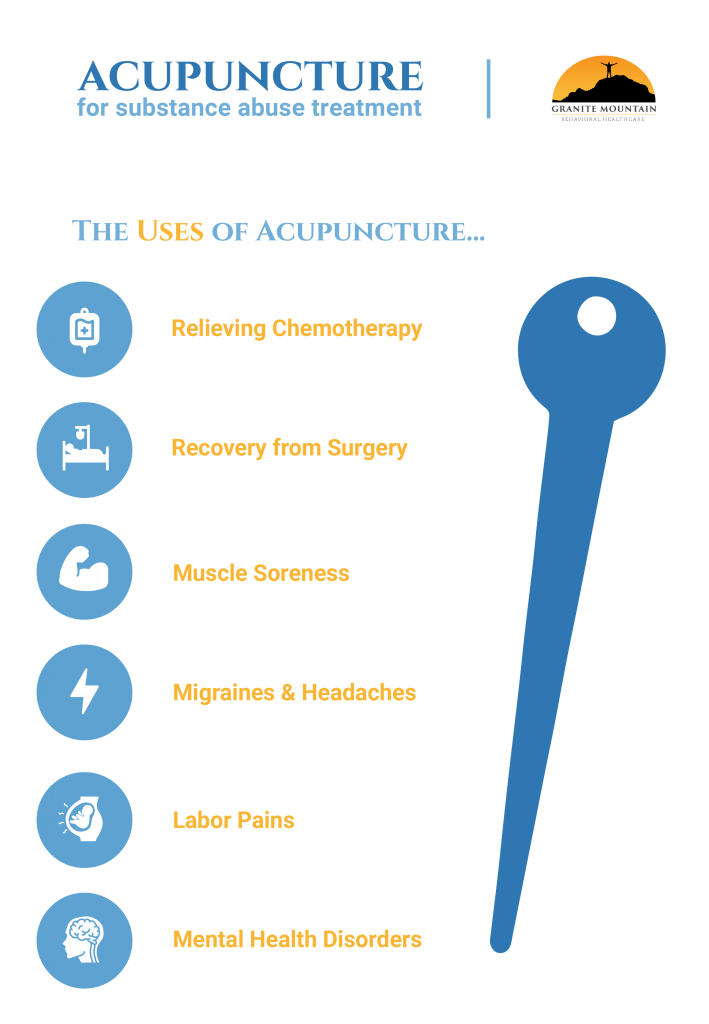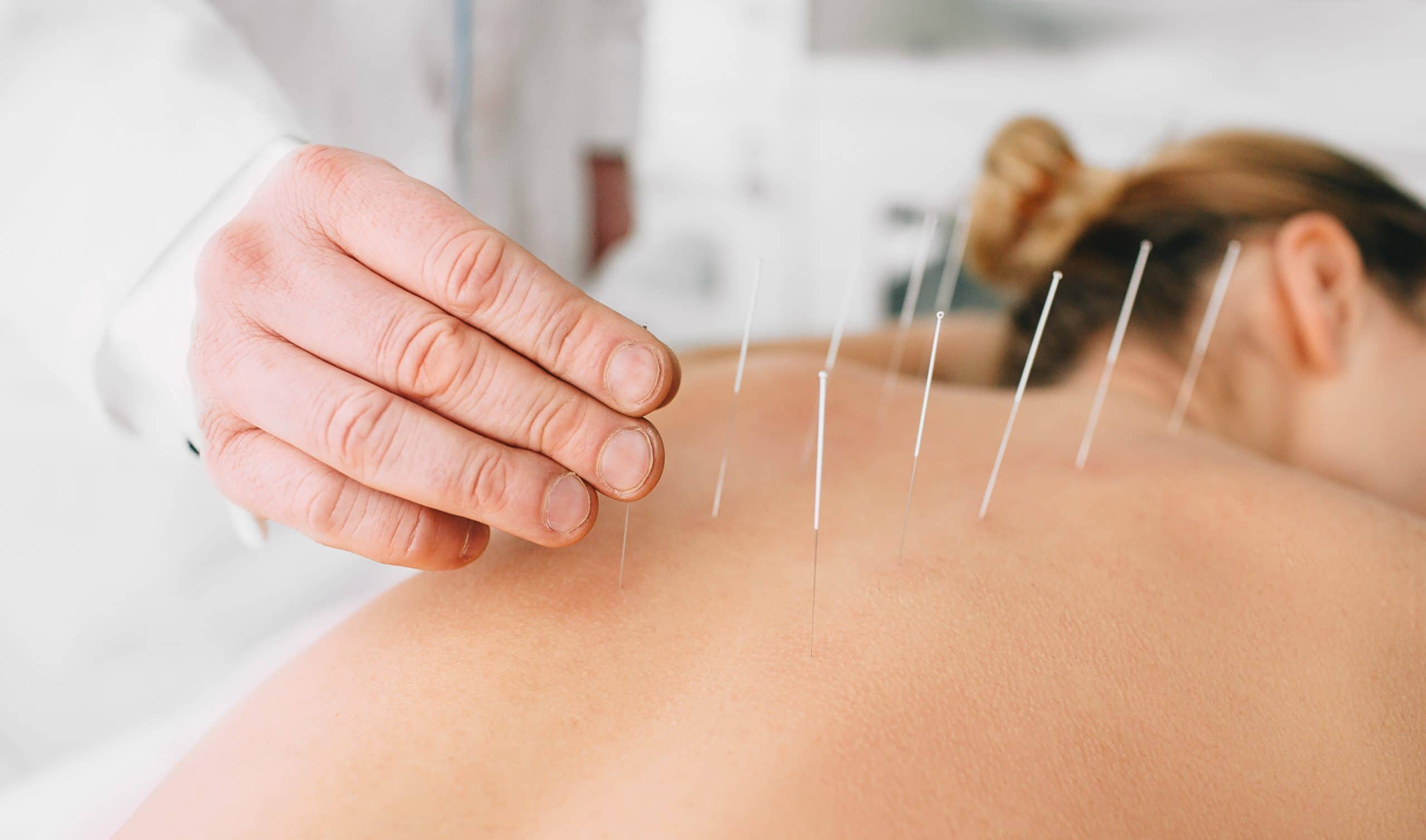Holistic therapy is a treatment that uses all-natural means to promote healing or sobriety. One commonly used holistic treatment is acupuncture. Acupuncture may seem like an out-of-the-ordinary way to treat addiction, but in reality, it is one of the oldest natural treatments known to man. Before choosing to utilize acupuncture in recovery, it is important to understand its history, what it is, and how it can benefit you.
What are Holistic Therapies?
A growing trend in medicinal circles over the last several decades has been the incorporation of “alternative” or holistic approaches. These holistic approaches, such as acupuncture, can be used for any number of ailments-from body soreness to addiction and everything in between. Due to the popularity of drug-free offerings, more and more treatment centers in the US are offering these types of therapies.
Holistic ideas refer to treatments or approaches that speak to the “whole person,” The focus is on both the mind and body and seeking healing for both/and. With trends pointing towards more “natural” options, these holistic approaches are becoming more popular and being offered regularly. Some of these holistic options include yoga, meditation, massage therapy, and acupuncture. Patients who adhere to these options can see direct benefits in the area they are hoping to improve, as well as great fringe benefits such as better fitness, better sleep, and lower cholesterol.
What is Acupuncture?
Acupuncture is an ancient art and healing method that uses needles and manipulation of various pressure points on the body to treat various health concerns. Generally, acupuncture involves the insertion of long, thin needles under the skin at specific points to promote healing. Acupuncture is an ancient Chinese art and healing method that uses the manipulation of various points on the body to treat a variety of health concerns. The needles are sized perfectly and sterilized to make sure no infection occurs. In addition to traditional needle-based therapy, other treatments, such as massage or herbals, are also used.
The theory behind acupuncture, historically, was that it keeps the “qi energy” of the body in balance. Today, acupuncture experts understand that acupuncture produces positive results by stimulating many different systems of the body, such as cardiovascular, endocrine, and immune. All acupuncture therapists must be fully licensed and trained in the nuances of their methods.
While acupuncture may seem like a far-fetched way to approach recovery, many people these days are trying acupuncture as an all-natural way to step into healing. Because there are very few risks associated with acupuncture, patients from all walks of life can try it for ailments ranging from eating disorders to depression to various addictions.
Uses for Acupuncture
Because it is relatively low-risk, acupuncture can be tried for basically any ailment. Patients report very little discomfort and positive results have been achieved from any different areas of health care. In general, acupuncture is most widely used for the following reasons:
- Reducing the effects surrounding chemotherapy and other cancer treatments
- Recovery from dental pain or procedures
- General muscle soreness or body aches
- Migraines or other headaches
- Labor or menstrual pains
- Various mental health disorders or addictions
The Risks of Acupuncture
The inherent risks of acupuncture treatment are extremely low if you have certified, competent therapists using safe needles. Some common post-treatment side effects of acupuncture include soreness, minor bruising, or brief bleeding. Still, not everyone is a good candidate for acupuncture and you may be at greater risk if you have any of the following issues:
- Bleeding disorders or clotting issues- You may be at greater risk for increased bleeding if you have a bleeding disorder or are taking blood thinners.
- Have a pacemaker- Because some acupuncture uses minor electrical pulses, you should not seek acupuncture treatment if you utilize a pacemaker
- Are pregnant- Some forms of acupuncture can potentially induce labor and lead to premature delivery.
 What to Expect Before an Acupuncture Treatment
What to Expect Before an Acupuncture Treatment
Every acupuncture therapist has a different and unique approach, with many blending Eastern and Western treatment philosophies. In order to determine the type of acupuncture treatment that will benefit you the most, your expert may ask detailed questions about your lifestyle, medical history, and behavior.
The initial pre-procedure intake can take up to 60 minutes. Follow-up appointments can take as little as 30 minutes. Commonly, treatment may be performed two to three times per week. However, the number and spacing of treatments will often depend on the condition being treated and its severity. Generally, most patients receive between six and ten total treatments.
What Happens During an Acupuncture Treatment?
Pressure points that are treated during acupuncture are located in all areas of the body. Oddly enough, the areas treated may not be close to the area for which you are seeking relief. For example, someone seeking acupuncture treatment for addiction may be surprised to find needles placed far away from their head and neck. Your acupuncture therapist will discuss the areas that he or she will be treated prior to your appointment. You will be given a gown, sheet, or towel and asked to lie facedown on a comfortable,massage-style table. The actual treatment involves the following
- Needle insertion-Specialized needles are placed below the skin, to varying depths, at pressure points across your body. Most patients do not even feel the needles. Generally, between five and 25 needles are used during treatment. IT is possible you will notice a mild ache at the point of insertion.
- Needle manipulation-Your therapist may lightly move or wiggle the needles once they are inserted. He or she may also apply other stimulants, such as heat or electrical stimulation.
- Needle removal- Generally, acupuncture needles are left in place for ten to twenty minutes before removal. Most patients report little to no discomfort after the needles have been removed.
While many people report good results after acupuncture, its effectiveness still varies. Because acupuncture is being used to treat such a wide range of ailments, including addiction, results can vary wildly from person to person. One patient may find instant results from migraines or other physical ailments whereas another patient can see little to no change. But again, because there is so little risk involved, acupuncture is gaining wide popularity for a number of different issues.
Can Acupuncture be Used on its Own?
There have been many good results with acupuncture for drug treatment, however, most rehabilitation facilities still tend to use it as a secondary method in conjunction with other treatments. It is better to consider acupuncture as a complementary or secondary treatment. While acupuncture does show promising signs of being an effective method of treating symptoms of drug addiction, it isn’t a good idea to use it as a singular treatment. Think of it as an alternative or supplemental treatment. For example, Acupuncture can be extremely effective in treating withdrawal symptoms, but it cannot medically detoxify someone struggling with addiction.
Perhaps the most appealing result of acupuncture is the way it promotes pain and stress relief as well as increases relaxation. With addiction, stress and anxiety often go hand in hand and acupuncture can be effective at treating both in a holistic way. While those who suffer from severe symptoms can still benefit from anti-anxiety and depression medication, acupuncture can absolutely help.
Acupuncture Treatment for Addiction
Beating drug addiction is an extremely difficult journey that requires a unique approach in order to succeed. However, acupuncture has emerged as a vital tool in the fight against opiate addiction and is being utilized ever-increasingly. Patients going through the detoxification process can greatly benefit from the calming effects of acupuncture.
In addition to traditional mental health treatment approaches, such as counseling and group therapy, acupuncture can aid patients in overcoming cravings and help stave off the dangers of relapse.
More and more therapists are turning to acupuncture to treat all types of ailments, including opiate addiction. Acupuncture treatments help patients to relax and draw focus away from cravings and destructive thoughts.
While it is not entirely understood how acupuncture is so effective, research shows evidence that acupuncture raises endorphin levels, which act as the body’s natural painkillers. A patient receiving acupuncture treatments is truly balancing their “yin and yang” energies and helping their body achieve healthier state-mentally and physically.
Acupuncture as an Alternative Treatment for Addiction
Although acupuncture is still widely perceived as an “alternative medicine”, many mainstream rehab facilities are adding it to their arsenal because of how effective it has proven in addiction treatment. In fact, a study done in 1989 showed that acupuncture, used in conjunction with other treatments such as psychotherapy, can be almost twice as effective at treating addiction as traditional therapy alone.
Acupuncture has proven to be an extremely effective alternative to traditional methadone-based detoxification treatments. Because methadone itself is an addictive drug, it is highly preferable to use a more natural detox approach if at all possible.
Avoiding the side-effects of methadone based detox is one main reason acupuncture use is skyrocketing. Addicts who used a methadone based treatment often find themselves becoming addicted to methadone instead. Therefore, acupuncture treatments are far more desirable than methadone treatments because there are no side effects or addictive qualities.
To inquire if you are a candidate for acupuncture as part of your addiction treatment, contact us today!



